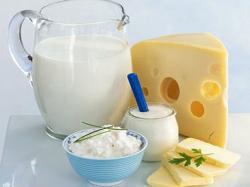Americans Are Unclear About Essential Nutrients In Their Diets
March 2, 2010 | 3 min to read

KANSAS CITY, Mo. — When it comes to dietary nutrients, most consumers don’t
know the whole story. A recent study by the Innovation Center for U.S. Dairy
revealed that the fact that milk delivers much more than calcium to the diet is
new “news” to consumers.
“Many consumers know about milk’s calcium benefits, but most are unaware that
dairy foods deliver eight other dietary nutrients considered ‘essential’ by the
U.S. Department of Agriculture (USDA),” says Stephanie Cundith, a registered
dietitian with the Midwest Dairy Council. “National Nutrition Month is the
perfect time for Americans to learn more about essential nutrients in foods and
their irreplaceable health benefits. It is important to get essential nutrients
from the foods we eat because the human body can’t manufacture them in
sufficient quantities to meet daily needs.”
Consumers know they need to eat healthy, but often focus strictly on counting
calories. “Monitoring calorie intake is not enough; it also is important to
ensure the foods you consume are nutrient-rich,” says Cundith. Consuming three
dairy servings every day provides exceptional nutritional value, including
significant amounts of vitamin D, protein, potassium and vitamin B12. From
repairing muscle tissue to maintaining healthy red blood cells, the nutrients
found in dairy foods work together to help support optimal health.
Dairy’s Unique Nutrient Package
NUTRIENT, WHAT IT DOES
Calcium: Dairy is probably best known for its calcium, which helps build healthy
bones and teeth.
Potassium: Potassium regulates the body’s fluid balance, helps maintain normal
blood pressure and is one of the essential nutrients the USDA says Americans
lack the most.
Phosphorus: Feeling sluggish? Phosphorus helps generate energy in the body’s
cells.
Protein: Dairy provides a good source of high-quality protein. The protein in
milk, cheese and yogurt builds and repairs muscle tissue and can help you feel
full.
Vitamin A: Vitamin A is important for maintaining healthy skin and vision.
Vitamin D: Also known as the sunshine vitamin, vitamin D is one of the nutrients
Americans lack the most. It helps promote the absorption of calcium and enhances
bone strength. One 8-ounce glass provides 25 percent of your daily requirement.
Vitamin B12: Vitamin B12 helps maintain healthy red blood cells and nerve
tissue. Milk and yogurt are both excellent sources of this essential nutrient.
Riboflavin: Also known as vitamin B2, riboflavin helps convert food into energy.
Niacin: Niacin (or niacin equivalent) is important for the normal function of
many enzymes in the body and is involved in the processing of sugars and fatty
acids.
Americans Aren’t Getting Adequate Nutrients
The 2005 Dietary Guidelines for Americans, published by the USDA and Department
of Health and Human Services, report many adults, adolescents and children fall
short on several of the essential nutrients needed for healthy body functioning.
The Guidelines recommend three servings of fat-free or low-fat dairy products
each day. However, Americans only eat about half of this amount. “Meeting the
recommended three servings per day of milk, cheese and yogurt is easy,” says
Cundith, “My family starts the day with a bowl of whole grain cereal and milk,
and we love fruit and yogurt as a snack.” A Cundith family favorite for dinner
is pulled pork soft tacos sprinkled with Colby Jack cheese.
This recipe and the whole story of dairy’s unique nutrient package can be found
at dairymakessense.com.
ABOUT MIDWEST DAIRY COUNCIL
Midwest Dairy Council is the nutrition education division of Midwest Dairy
Association. The Council’s mission is to promote a healthy diet through
nutrition education and the use of dairy products to consumers, health
professionals and teachers. Midwest Dairy Council is funded by check-off dollars
from dairy farmers in a nine-state region that includes: Minnesota, South
Dakota, North Dakota, Iowa, Illinois, Missouri, Kansas, Arkansas and eastern
Oklahoma. For more information, visit www.midwestdairy.com or
www.dairymakessense.com.
Source:
Midwest Dairy Council
